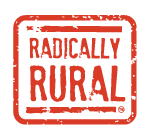The art world, especially in rural areas, is often seen as elitist. Track leader and Executive Director of Arts Alive!, Jessica Gelter, believes that art-led initiatives have a function to play in rural community development. Sessions she’s planned at Radically Rural, she hopes, “will provide the opportunity for individuals and communities to think about ingrained classism in the art world and how to move away from that narrative.” She has organized three programs at Radically Rural-Remote on Sept. 24, which this year is being held online starting at 8 a.m. with a keynote speaker, and then with track sessions at 9 a.m., 11 a.m. and 2 p.m. and a closing speaker at 4 p.m. An interactive idea jam, featuring successful rural initiatives, will take place from 1 p.m. to 2 p.m.
Racial and Geographic Equity in Arts Funding – 9 a.m.
Savannah Barrett, director of Programs for Art of the Rural, will discuss the importance of arts and culture funders committing to more equitable philanthropic practices. Equity, both geographically and demographically, in grant-making is key to making social changes in the creative world. Barrett will address ideas, such as how intersectional leadership inform philanthropy and how regional arts organizations are supporting a diverse representation of voices in arts leadership. The panel will include experts who have developed inclusive policies for decades and are excited to share their wealth of knowledge to grantors, organizations and individuals who are looking to deepen their practice.
Cultivating a Sense of Belonging in Rural Communities – 11 a.m.
Anthony Poore, director of N.H. Humanities; dancer Rachel Balaban; and Catherine Stewart of the N.H. Theatre Project, will lead participants in activities that promote empathy, connection, understanding and belonging and are being implemented in communities across the country. Barbara Shafer Bacon of Americans for the Arts will then lead the group in an activity to develop a deeper understanding of metrics and evaluation, answering the question: How do you demonstrate outcomes for creating a sense of belonging? Lastly, participants will be invited to discuss their experiences with session facilitators.
The Essential Arts: Making a Case Statement – 2 p.m.
Cynthia Cutting, director of the Museum of the White Mountains; Marianne Barthel, director of the Arts Program at Dartmouth Hitchcock Medical Center; Amanda Whitworth, a dancer; and musician Kate Beaver will facilitate “break-out groups” during which participants can choose an art medium and engage in discussion and reflection on how those art forms have impacted their lives. Facilitators will condense participants’ anecdotes and make a case statement to the larger group on why specific art forms are important to communities.
For more information on the Radically Rural – Remote Summit, or this year’s track themes, visit the event’s website at radicallyrural.org
